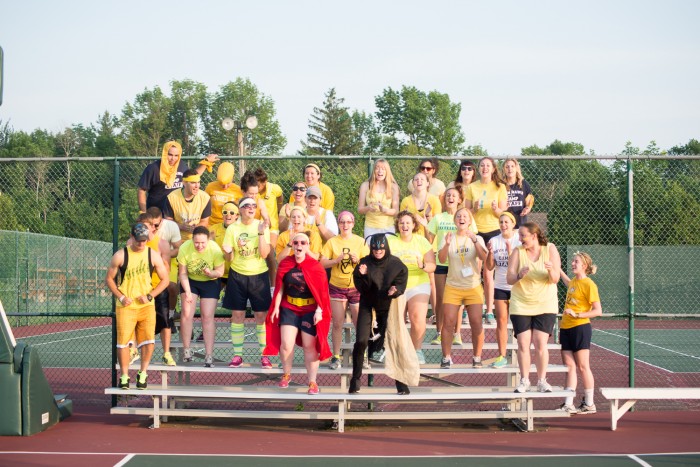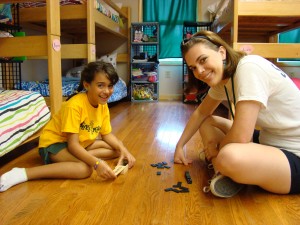
If you’ve talked to a friend who’s been a camp counselor, or if you’ve read anything at all about working at camp, you’ve heard all the usual promises: It will change your life! You’ll learn so much! You’ll discover things you didn’t know about yourself! It’s the hardest job you’ll ever love!
Sounds great. But what does all that really mean?
Camp is one of those experiences that can be hard to describe to someone who hasn’t experienced it. Imagine trying to explain your favorite flavor of ice cream to someone who has no idea what ice cream is:
“Well, it’s cold, and it’s creamy, and it tastes like chocolate.”
“Like chocolate milk?”
“Kind of, but not really. It’s solid, and you eat it with a spoon. Or you can eat it in a cone.”
“So it’s a hard cone of chocolate milk?”
“No, it’s soft, but it’s solid. It’s a soft solid, and it’s rich and chocolaty!”
“So it’s a soft cone of chocolate milk that you eat with a spoon?”
That’s kind of what it’s like to try to explain camp to someone who hasn’t been there to experience it for themselves. We do our best to prepare staff members through an in-depth interview process, a week or more of full-time training, and lots of informative handbooks and reading materials… but the reality is, as much as we can prepare you for the schedule, the traditions, the structure of camp, the rules and the girls’ individual personalities, the only way to find out what kind of counselor you truly are is to dive headfirst into the summer. (And as with all headfirst diving, we make sure you’re properly equipped and safety-minded and diving at the correct depth!)
While the only way to know what your summer will truly be like is to experience it, there are a few things we can promise you’ll learn during your time as a camp counselor. Many of them are skills that will have applications in your life as a student or professional. Others — well, others will just mark you as a member of the sorority of experienced camp counselors!
The importance of schedules — and teamwork:
Camp runs like a tiny town, and all the various parts — program areas, Cabin Row, the dining hall, the health center — function like interlocking gears. They all turn together, and they all turn one another. When one of those gears slows down, they all slow down. That’s why, to keep things running smoothly, we all live by a routine. The most important players in keeping that routine functioning are our counselors, and by the end of the summer you’ll be a pro at managing time and helping keep a group of kids running on schedule. After that, managing your school or work schedule will be a breeze.
How to be prepared for any circumstance imaginable:
Pop quiz: You’re on the bus on trip day and one of your campers feels queasy. What do you do? Not to worry: You came prepared, knowing that this particular camper gets motion sick. You made sure she took her Dramamine before she got on the bus, and you’ve got a bottle of water and health center-approved nausea meds in your trip bag. Are you psychic? Nope — just well-prepared, thanks to the trip leaders who made sure you knew what to expect and had the tools you needed to keep everyone happy and healthy. You never know what will happen at camp, but as a counselor you’ll learn how to be prepared for what might come up — what to do, where to get help, and how to get your group back on track after a disruption.

All the words to every top pop song of the summer:
You’ll hear them at rest hour, shower hour, bedtime, cleanup, Talent Night, on bus rides and being sung around camp. Prepare to get to know Ariana Grande, One Direction, or whoever happens to be the next breakout star of the summer.
How to navigate in new places:
If you’re coming to camp from another part of the country — or the world — the summer is a time to experience new places, both at camp, on trips and on your day off. Whether on camp trips or during free time, many of our counselors see places they’ve never before experienced — anything from busy New York City to sunny Hershey Park.
What it means to be a role model:
The phrase “role model” has positive connotations, and at camp you’ll quickly learn that being a good role model takes a conscious effort. Campers will take their cues from their counselors whether the behavior they’re modeling is appropriate or not, and it won’t be long before you realize how your attitude ripples through your cabin or program area. Some days you’ll be tired or cranky, and it will seem hard to put on a smile and encourage your campers to join you in having a positive approach to the day. But when you make the effort to be a great role model, you’ll see that your positivity makes a difference for the better.
How many bracelets fit on a single wrist:
Beaded, braided, knotted from embroidery floss, woven on a Rainbow Loom or improvised from hair ties… It’s more than you think.
How to thrive in new situations:
Many of our counselors are full-time college students, and in many ways, the structure of camp couldn’t be more different from the structure of college life. Yet good counselors thrive in both environments. Your ability to adapt, learn new routines, and embrace a different kind of lifestyle is a muscle — the more you use it, the stronger it gets. And there’s no better place to flex that muscle than in the unique setting of camp life.
The secrets of Chocolate Banana Night:
We really can’t tell you too much more about this one. No, seriously — we’ve said too much already.
